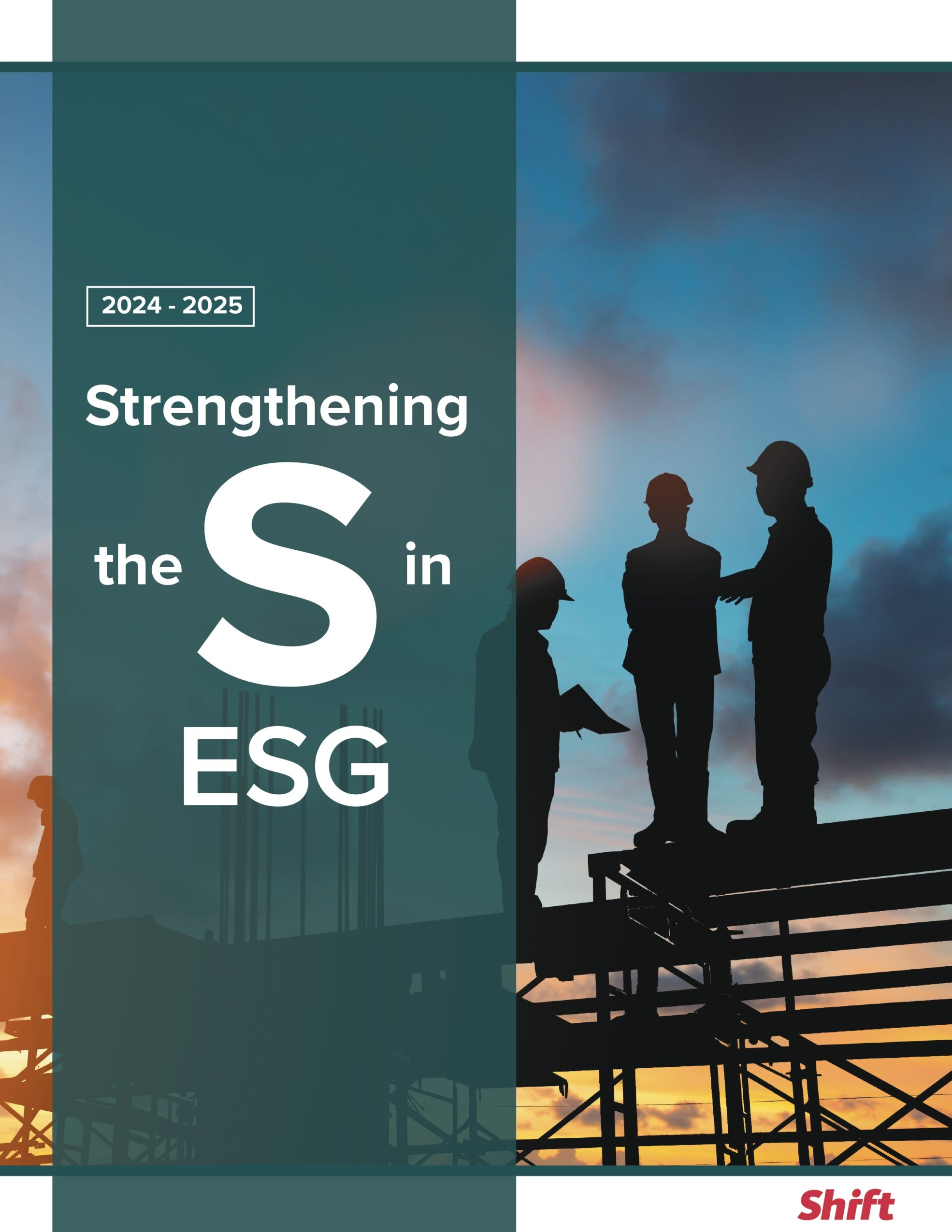This series captures the research findings from our analysis of 3073 social and governance indicators used in ESG data providers’ products or reporting requirements.[1] In our Guardrails, we focus first on the problems, spotlighting the types of indicators that offer minimal insight, or worse, incentivize poor practices. In our Guidelines, we then turn to indicators and metrics that are more robust, illuminating the pathway to better measurement. In our Thematic Deep Dives, we review ESG indicators related to specific issues (Occupational Health and Safety, Living Wage, Community-Focused Impacts). These deep dives identify pitfalls in indicator formulation as well as good practices that can inform better measurement of companies’ social performance on these topics.
Across the series, we will exemplify the good, bad and ugly of social indicators and metrics. Our goal is not to offer yet another set of competing indicators, but to share what we’ve learned about good indicator design in order to inform healthy debate, collaboration and innovation to improve the S in ESG.
This series is for everyone and anyone working to improve the ways in which we evaluate companies’ social performance.
Deep Dive Series
A series of deep dives evaluating better social indicators and metrics for occupational health and safety, living wage, and community-focused impacts.
3 resources
DEEP DIVE 01: Occupational Health and Safety Indicators

DEEP DIVE 02: Living Wage Indicators

DEEP DIVE 03: Community Focused Indicators
Guardrails and guidelines for indicator design
In climbing, guidelines are cords or ropes to aid passers over a difficult point or to permit retracing a course. Guardrails are physical barriers used to prevent people from falling from a height or from straying from a pathway or road into dangerous areas. So, both are put in place when the journey and terrain may be hard to navigate.
In the context of designing social indicators and metrics, we need both guardrails and guidelines, so we’ve structured our initial findings within the series around these.
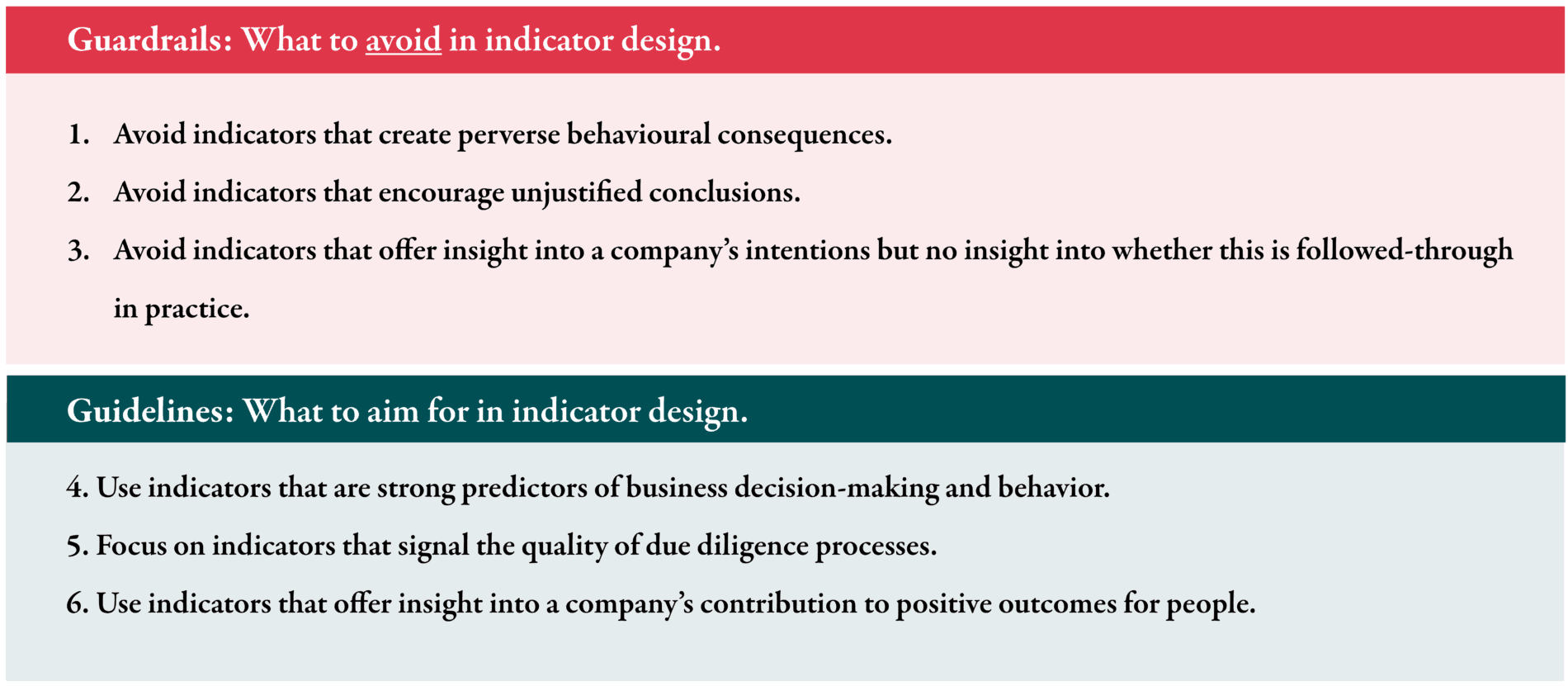
If we fail to reclaim the measurement of companies’ social performance as a tool to advance business respect for human rights, the S in ESG will remain divorced from the investor and business decisions that determine whether business is done with respect for people’s dignity. We hope this series can play a part in sustaining, advancing and scaling practices that lead to better outcomes for workers, communities and the people impacted by the use of products and services.
Guardrails
A series of guardrails for designing better social indicators and metrics.
3 resources
Guardrail 01: Avoid indicators that create perverse behavioral consequences.

Guardrail 02: Avoid indicators that encourage unjustified conclusions.

Guardrail 03: Avoid indicators that offer insight into a company’s intentions but no insight into whether these are followed through in practice.
Guidelines
A series of guidelines for designing better social indicators and metrics.
6 resources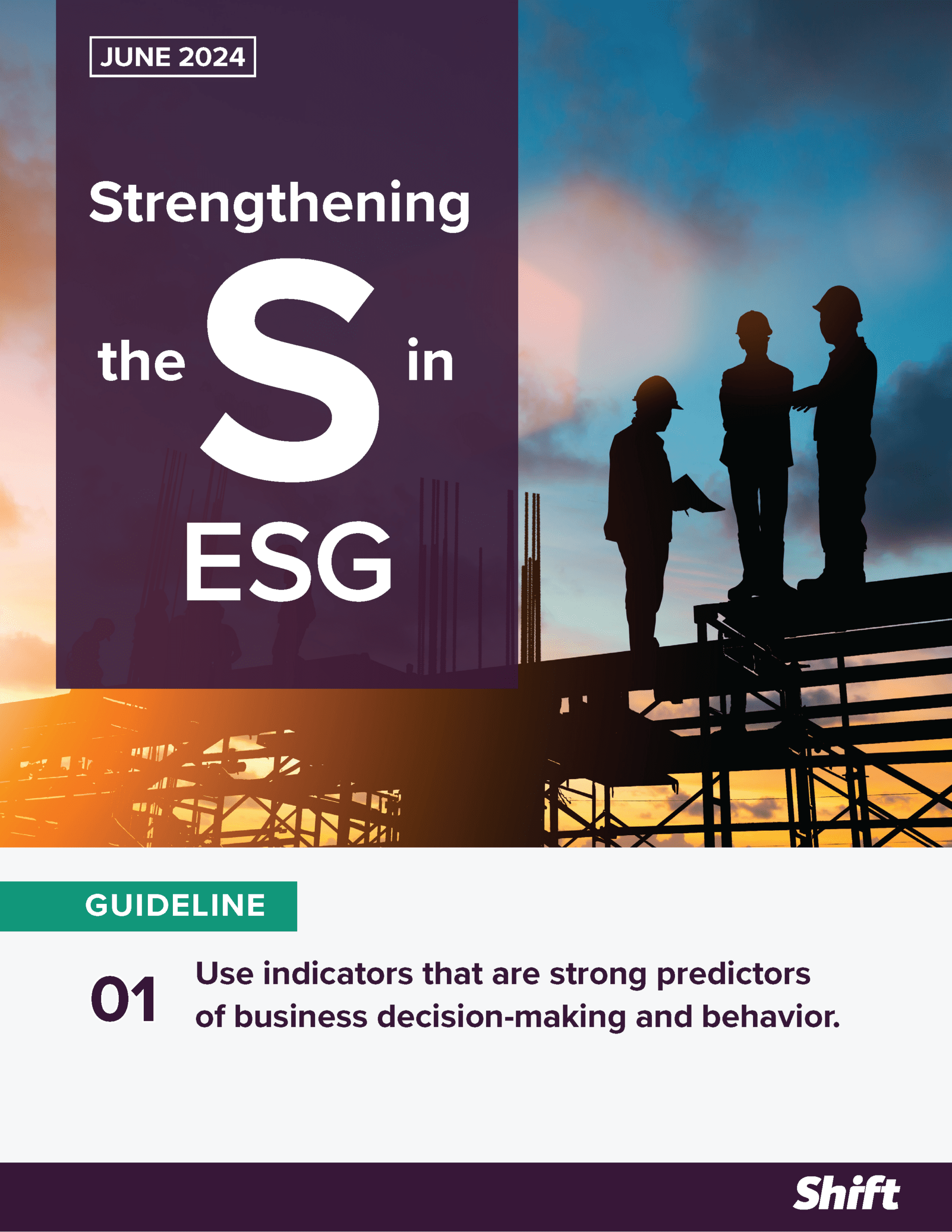
Introduction to Guideline 01: Use indicators that are strong predictors of business decision making and behavior.
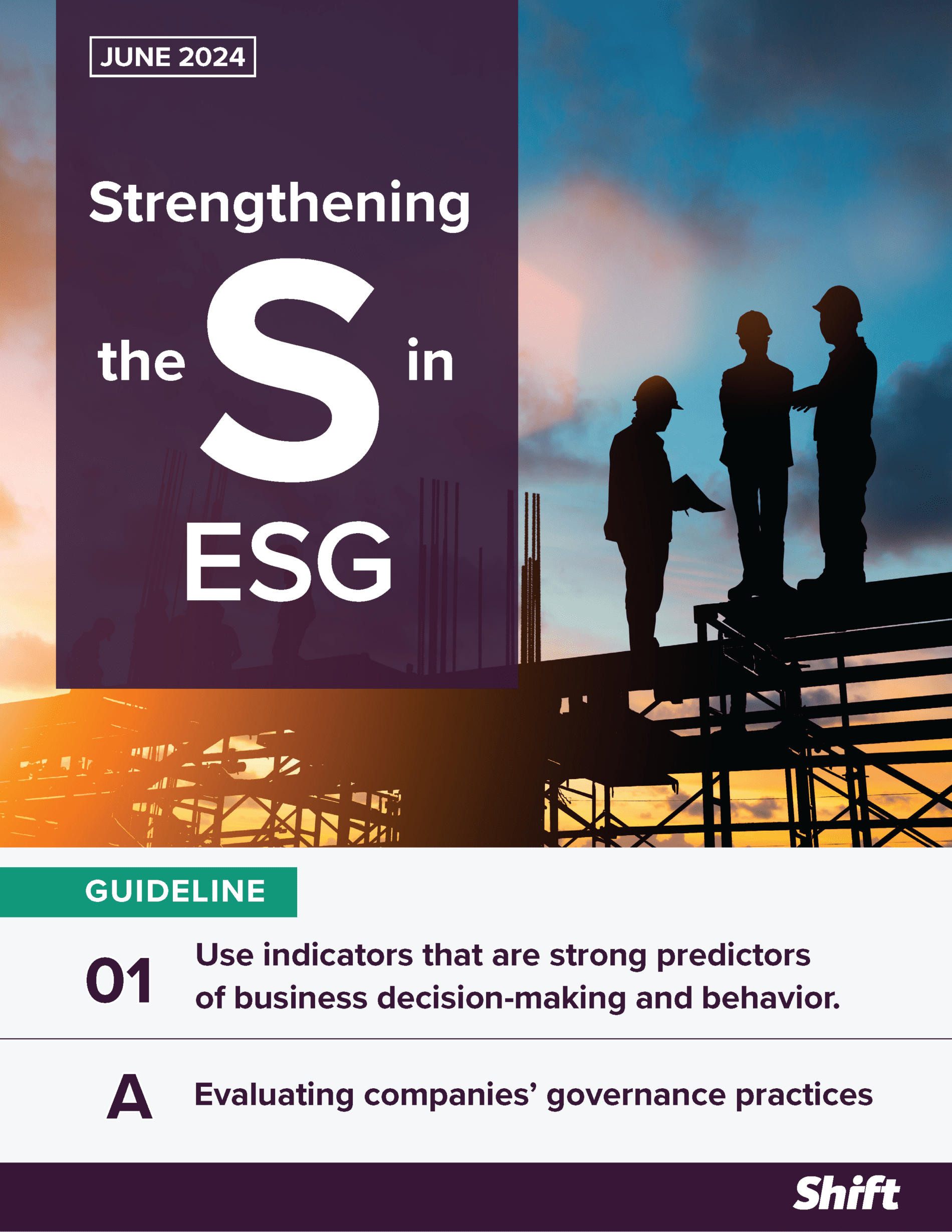
Guideline 1: Use indicators that are strong predictors of business decision making and behavior.
A: Evaluating companies’ governance practices
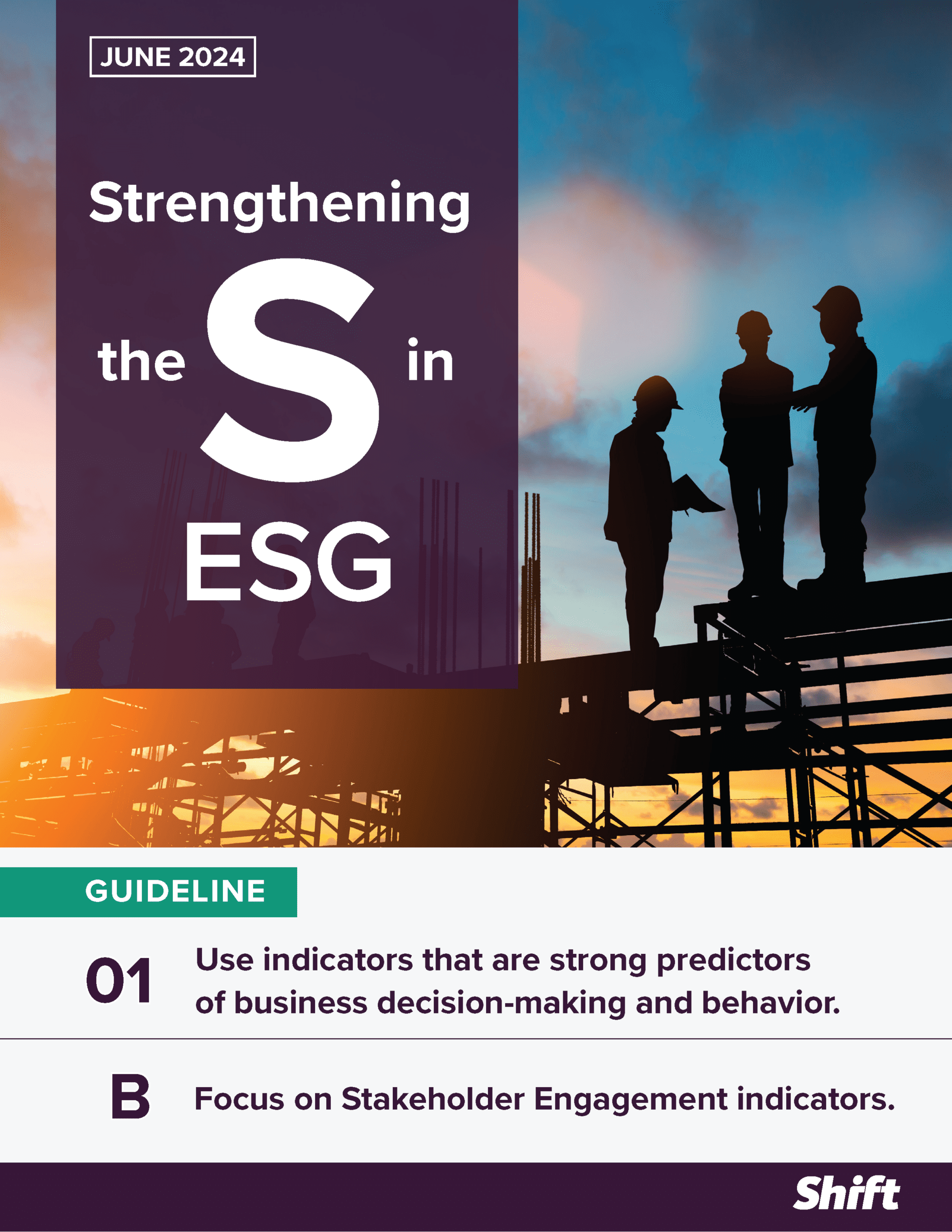
Guideline 1: Use indicators that are strong predictors of business decision making and behavior.
B: Focus on Stakeholder Engagement indicators.
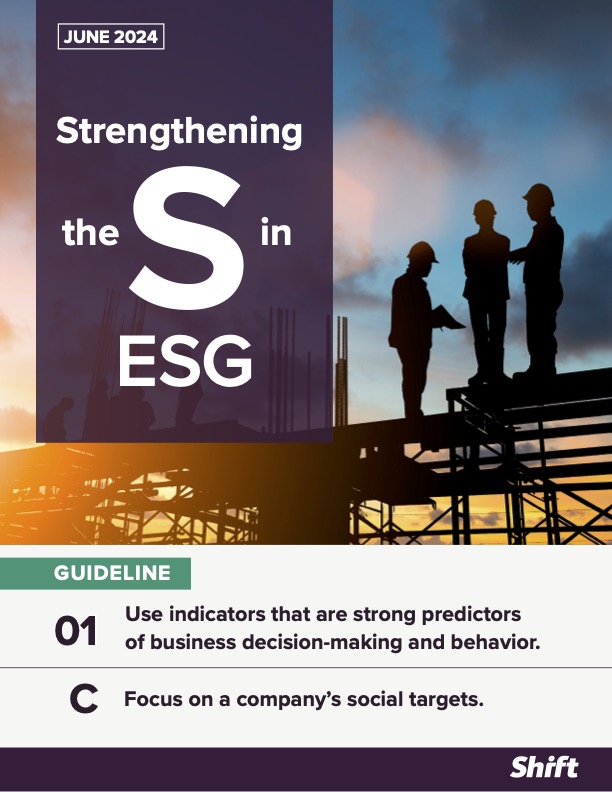
Guideline 1: Use indicators that are strong predictors of business decision making and behavior.
C: Focus on a company’s social targets.
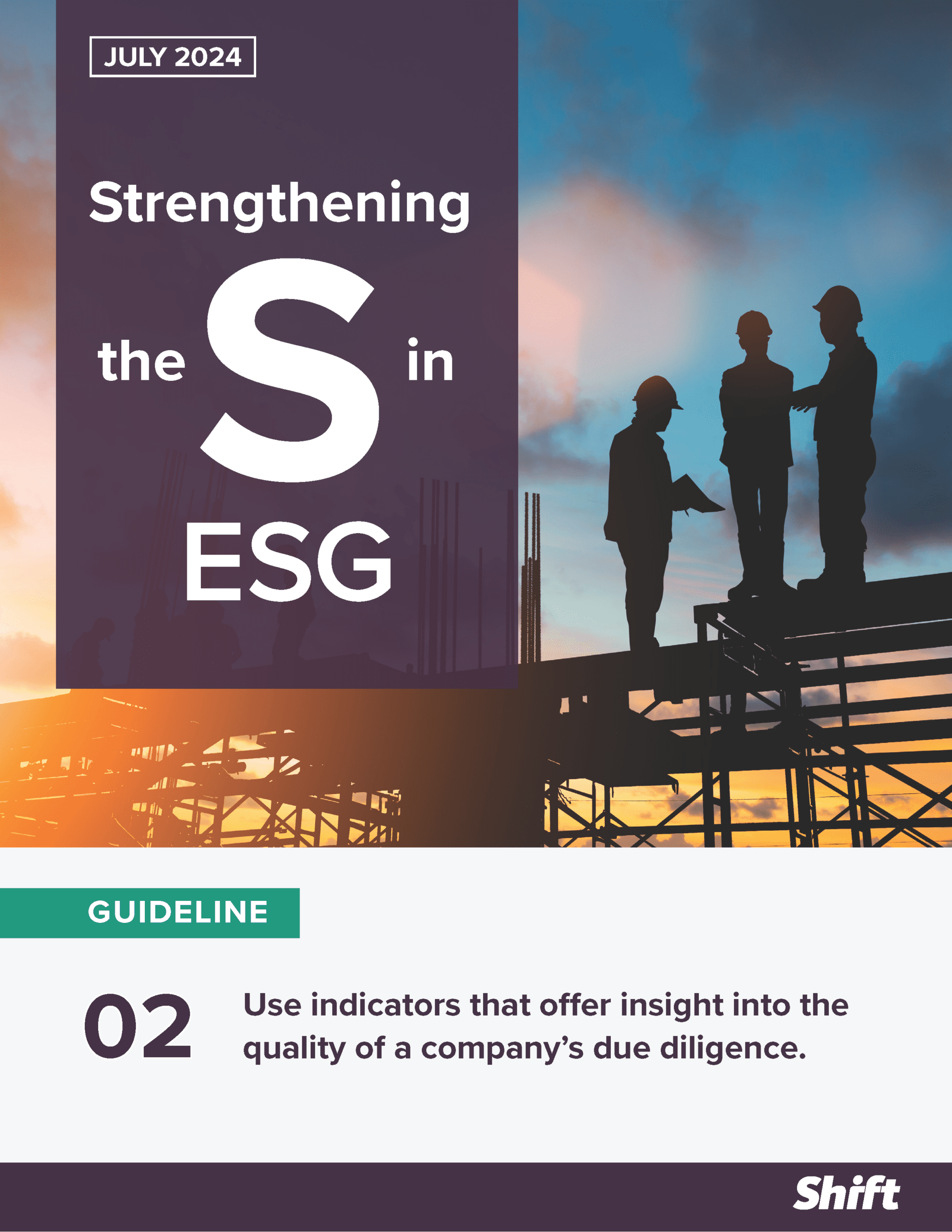
Guideline 2: Use indicators that offer insight into the quality of a company’s due diligence.
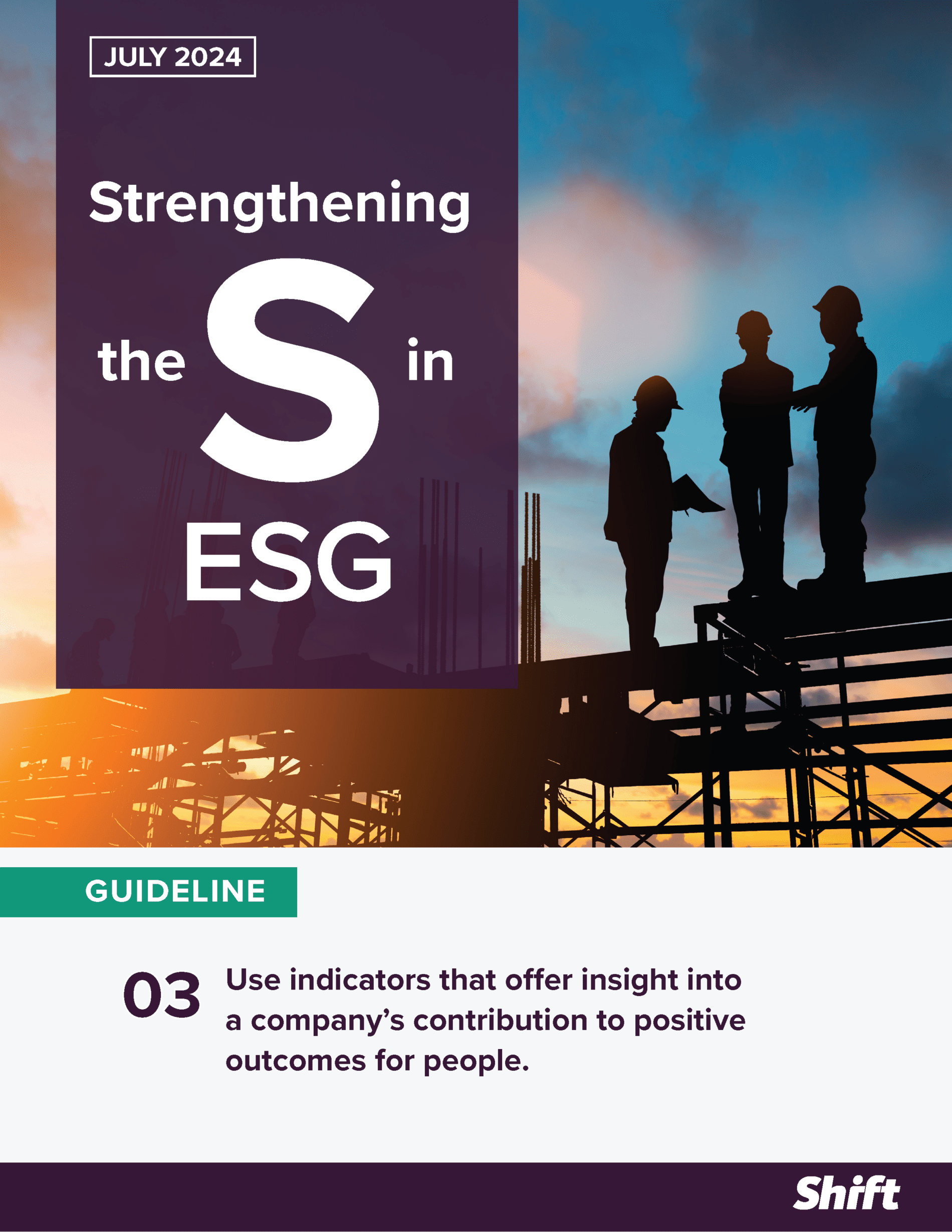
Guideline 3: Use indicators that offer insight into a company’s contribution to positive outcomes for people.

Advancing the S in ESG
The field of sustainability and responsible business conduct is faced with a significant opportunity: to coalesce around a core set of select, standardized indicators and metrics that meaningfully measure companies’ social performance regardless of their industry sector. This is key to equipping investors, business leaders, regulators and civil society with the tools to push to scale business practices that are in line with the principle of basic dignity and equality for all.
Success will significantly contribute to tackling inequalities, ensuring business actions towards net zero and net positive have the social license to proceed at the urgent pace required, and adapting business models and global value chains so that they deliver resilience to businesses and the stakeholders they impact. Failure risks ushering in more, already well-catalogued business-related harms and risks to people, planet and prosperity, likely with evermore multi-generational consequences.
The good news is that most stakeholders have embraced the pressing need for convergence around corporate sustainability reporting standards, including the indicators and metrics against which companies should disclose information and that should be used to evaluate corporate performance. Even better, recent institutional coordination and collaboration has set the stage for well-governed and inclusive processes needed to achieve such convergence.
Barriers to strengthening the S in ESG
Any ambitious project has risks that need managing. The challenge of building consensus across diverse stakeholders around indicators and metrics that offer credible insight into a company’s social performance is no exception.
Some risks are the consequence of positive dynamics. For example, the welcome growing attention to the S in ESG has resulted in thousands of social indicators and metrics already being developed by mainstream data providers and more targeted ranking and rankings. But the risks is that in a bid to identify a smaller set of indicators, we select the most commonly used indicators, in spite of broad recognition that these may not be fit for purpose.
In addition, the urgent need to effect a step change in the scale and quality of corporate reporting and assessment on social issues also carries the risk that project timelines prevent us from interrogating the devil in the detail of indicator formulations, such as when indicators may have perverse, unintended consequences.
The consequence of such risks is more than inconvenience and frustration. We could end up with solutions that confuse decision-makers, reflect the lowest common denominator of thinking and practice, or fail to ward off critiques of blue-washing and corporate capture, but also of so-called woke capitalism.
[1] Shift was unable to verify whether the non-public indicators and metrics that we used for our analysis are the most up to date versions used by data providers at the time of writing (April 2024). We also recognize that the underlying methodologies used to reach a judgement on a company’s performance against an indicator may offer more nuance that we could not access for our research.
Understanding Impact Materiality: ESRS Reporting for Financial Institutions
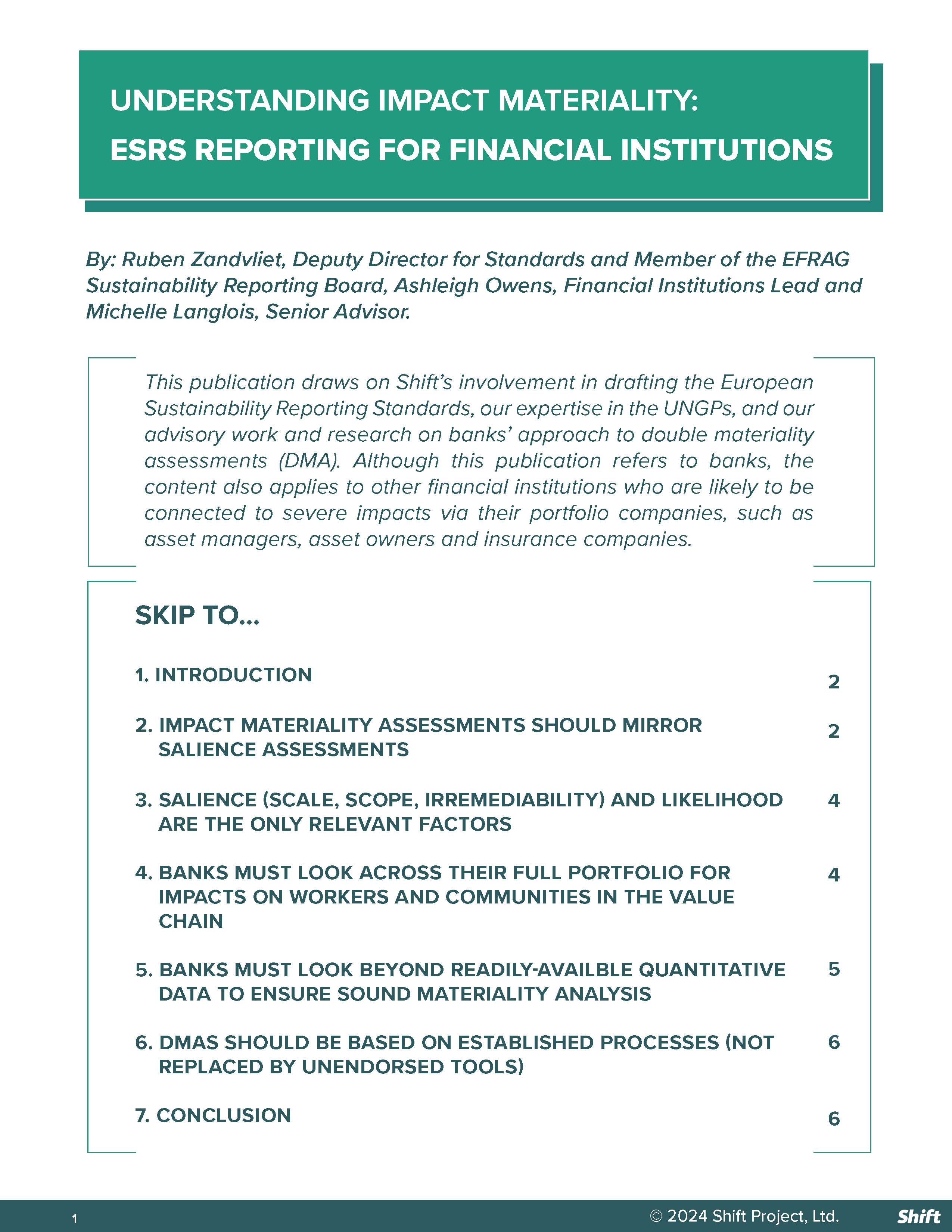
This publication draws on Shift’s involvement in drafting the European Sustainability Reporting Standards, our expertise in the UNGPs, and our advisory work and research on banks’ approach to double materiality assessments (DMA). Although this publication refers to banks, the content also applies to other financial institutions who are likely to be connected to severe impacts via their portfolio companies, such as asset managers, asset owners and insurance companies.
Financial institutions and other companies are currently preparing their first reports under the EU’s Corporate Sustainability Reporting Directive (CSRD), based on the European Sustainability Reporting Standards (ESRS). Many banks, however, appear to be incorrectly interpreting and applying the requirements in the ESRS on impact materiality. These misinterpretations would severely undermine the double materiality assessment (DMA), which is the cornerstone of sustainability reporting. The result of flawed DMAs is that banks will fail to report on material human rights impacts that they are involved with via their client relationships.
This resource offers urgent clarifying guidance for banks to ensure that their Double Materiality Assessments adequately meet EU reporting requirements by leveraging the underlying international standards on corporate respect for human rights (the UN Guiding Principles on Business and Human Rights, and the OECD Guidelines).
Tackling Child Labor: A Guide for Financial Institutions
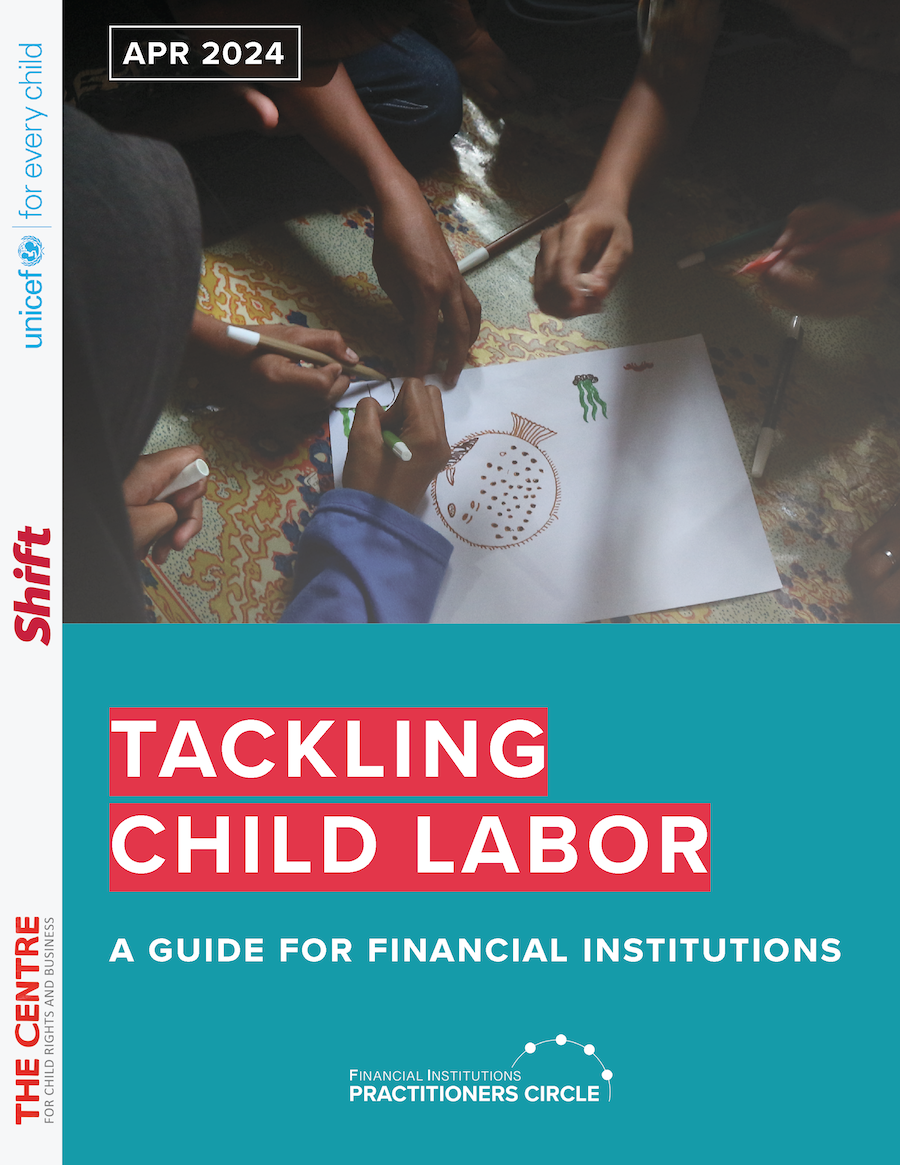
Also Read
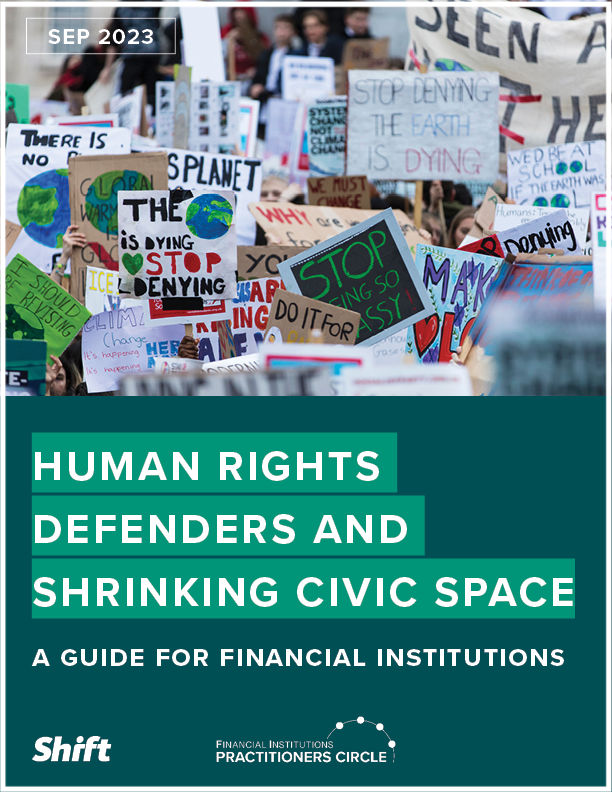
September 2023 |
Human Rights Defenders and Shrinking Civic Space: A Guide for Financial Institutions
ReadIn June 2023, following concern from member banks over the persistent scourge of child labor in global value chains and recent reports of the alarming increase in child labor – particularly migrant child labor – in the United States, Shift held a peer-learning session of its Financial Institutions Practitioners Circle on the topic. The session explored how banks and financial institutions can strengthen their efforts to respect children’s rights, particularly in the context of child labor. As a report by UNICEF, Save the Children and the UN Global Compact noted, children are still too often invisible in ESG reporting; and the financial sector can play an important role in changing this.
This resource is a joint publication by Shift, The Centre for Child Rights and Business and UNICEF. It captures some of the key take-aways from this session, and draws on the experience of the three organizations working with real-economy companies and financial institutions.
Financial Institutions Practice Groups

As we’ve seen through our advisory work with investors, banks and other portfolio-based institutions, investors and lenders are uniquely positioned to advance business respect for human rights – and they progress further when they work together. Practice Groups are an opportunity to strengthen capacity to manage portfolio risks and impacts on people, grounded in reality and guided by peer insights into best practices and challenges.
This year, Shift is piloting practice groups with committed practitioners to dive deeper into some of the thorniest issues facing investors and lenders when it comes to embedding respect for human rights into business practices. Over a six-month period, participants will take part in virtual workshops with peers, one-on-one engagement with Shift, and thought-provoking institution-specific work, to progress their efforts around business respect for human rights. In a Chatham House setting, practitioners will be sharing pre-competitive approaches – and challenges – to develop their capacity to integrate a risks-to-people lens across their portfolios.
Groups will be facilitated by Shift and expert guests. As members, participating institutions will also have access to Shift’s bilateral advisory support.
Numbers in the practice groups will be capped (4-8 institutions) in the first year.
Our Expertise
Shift has worked with investment managers, asset owners, managers, commercial banks and real economy companies for almost a decade. In that time, we’ve developed a nuanced understanding of the unique challenges and opportunities faced by investors, lenders and their portfolio companies – what questions to ask, which levers are catalysts for business respect for human rights and where organizations must push the boundaries to meet their responsibilities and commitments.
As the leading center for expertise on the UN Guiding Principles on Business and Human Rights, we also support ministries, regulatory agencies, intergovernmental organizations, reporting standards bodies and multistakeholder initiatives to translate considerations of impacts on people into standards that drive business behavior.
Fees and Requirements
Fees vary by Practice Group – please download the respective brochure for details.
In keeping with Shift’s mission orientation, we are purposely selective about who we work with – so we’re looking for organizations that can demonstrate a genuine commitment to sharing their challenges and successes with their peers. If you’re interested in being a part of this year’s Practice Group pilots, please contact Ashleigh Owens (Financial Institutions Lead) at ashleigh.owens@shiftproject.org.
Financial Institutions Practice Groups
4 resources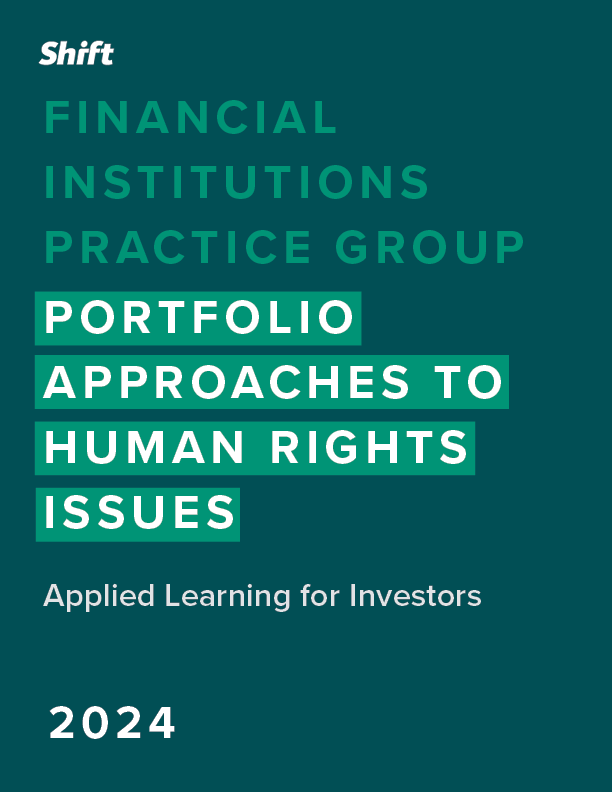
Portfolio Approaches to Human Rights Issues: Applied Learning for Investors
Through a series of in-depth virtual peer-learning workshops and dedicated advisory support, this six-month deep dive will help investors identify and manage human rights issues in a portfolio context.
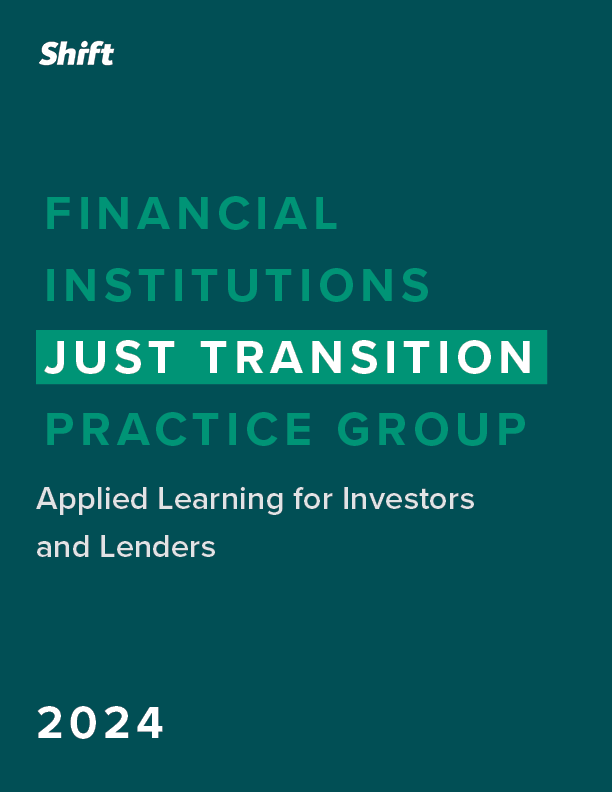
Just Transition: Applied Learning for Investors and Lenders
Over six months, through virtual workshops and one-on-one engagements, Shift will work with a community of portfolio-oriented investors and lenders to take practical steps forward on the human dimensions of climate change and the Just Transition.
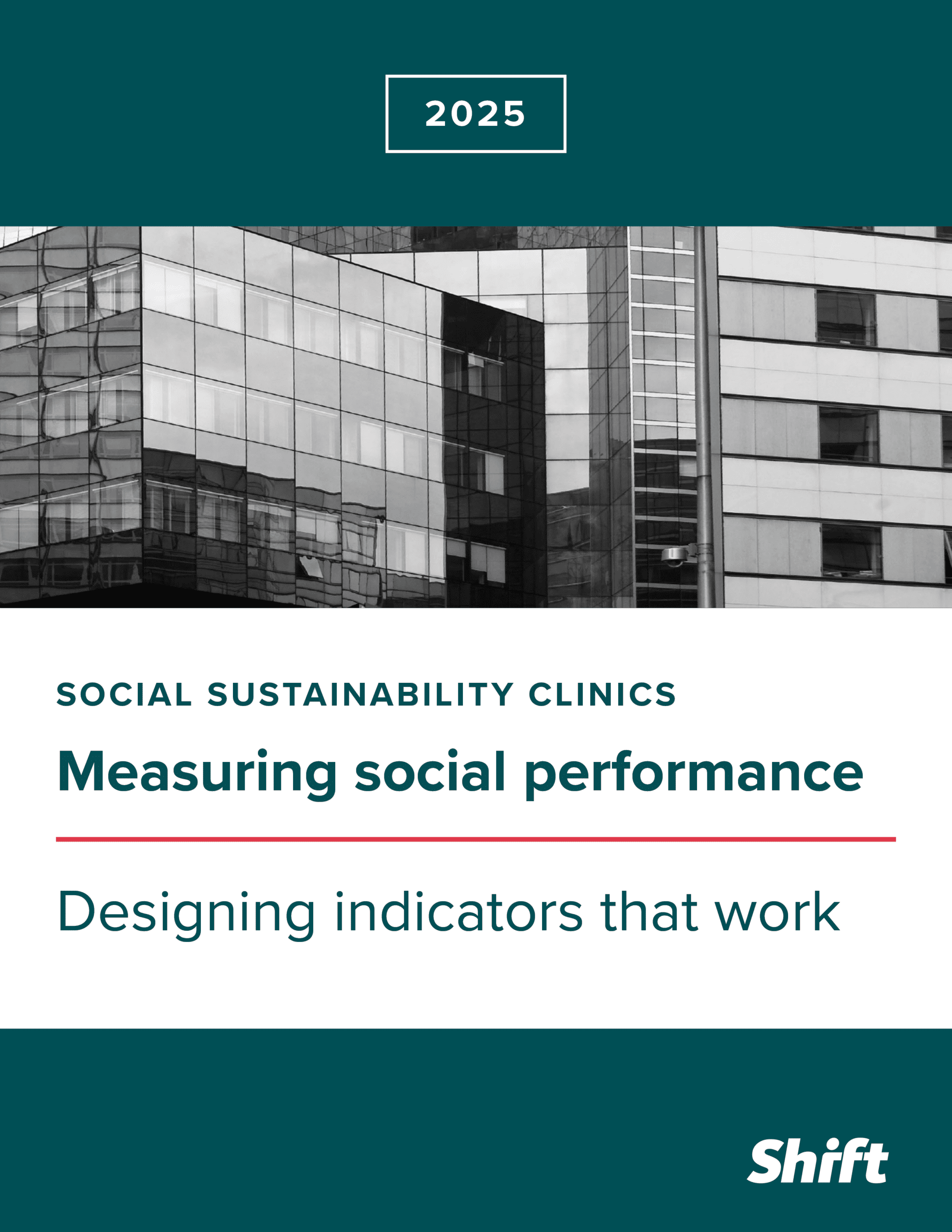
Measuring social performance: Designing indicators that work
Measuring Social Performance: Designing indicators that work will seek to advance the design and application of metrics and indicators of businesses’ human rights performance. Over four workshops, participants will explore how to design effective metrics and indicators, and share their own experience of tracking portfolio company progress in addressing adverse impacts on people.
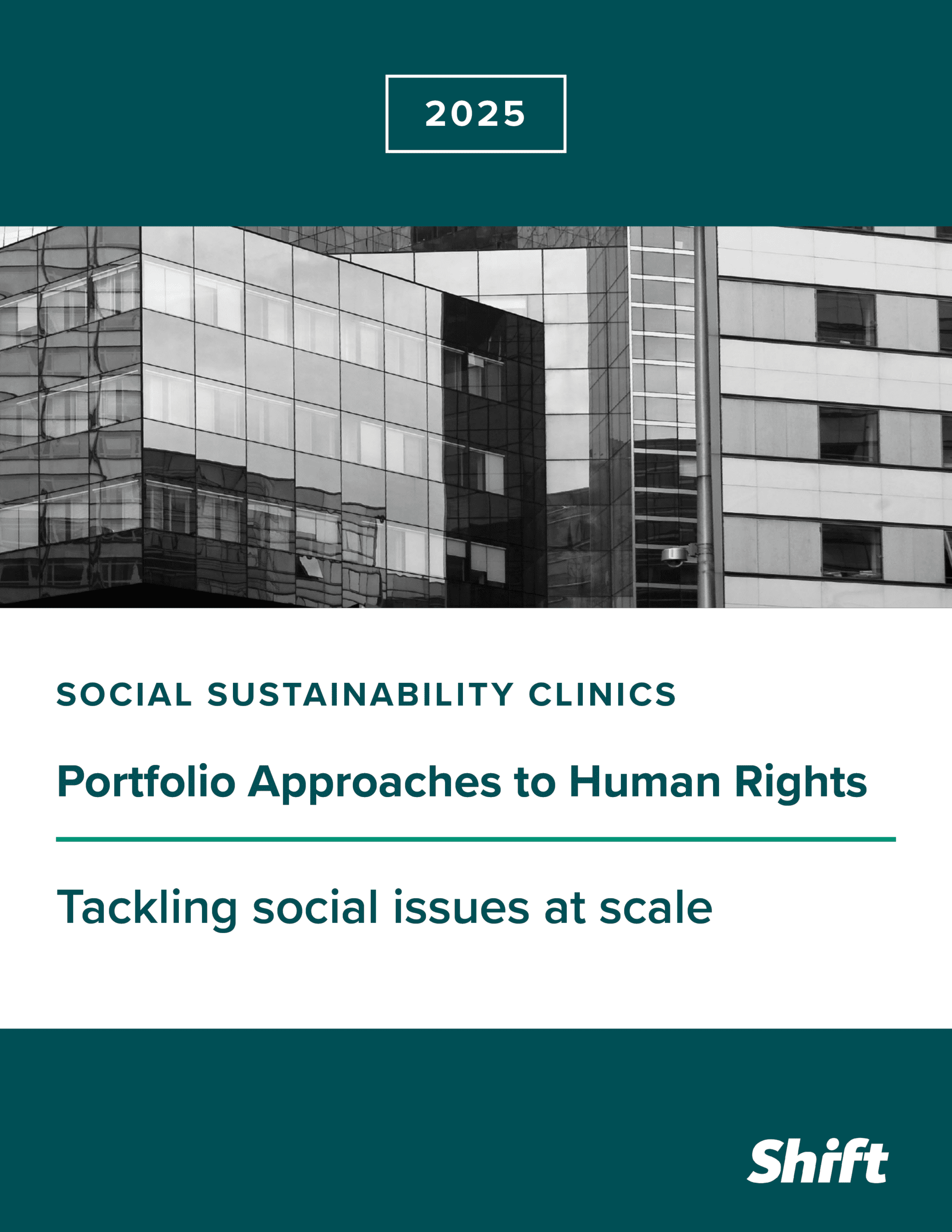
Portfolio Approaches to Human Rights: Tackling social issues at scale
Through generous funding from the Generation Foundation, we are able to offer this clinic at no cost to accepted participants.
Shift’s Response to the UN Working Group Consultation on Investors, ESG, and Human Rights
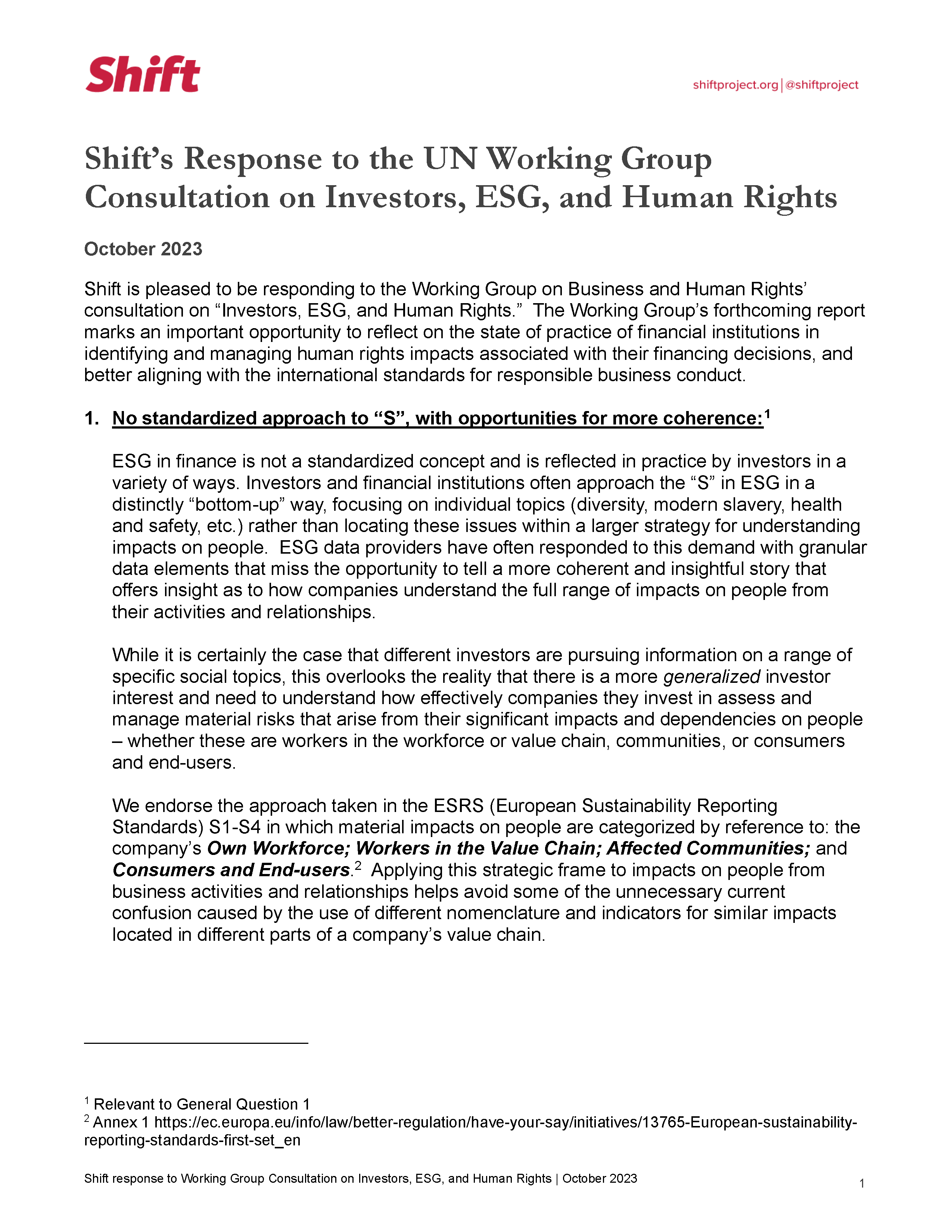
In 2016, ESG investing amounted to US$ 22.8 trillion of global assets – by 2025 it’s expected to reach US$ 53 trillion.[1] Yet, while lenders and investors are increasingly using Environmental, Social and Governance (ESG) indicators in their decision-making processes, confusion about metrics persists, particularly when it comes to the ‘S’ in ESG. So, it’s vital that these approaches align with the UN Guiding Principles on Business and Human Rights, which leading financial institutions, states and businesses have been working to implement for over a decade.
In June 2024, the United Nations Working Group on Business and Human Rights will present a report to the UN Human Rights Council on the approaches to ESG taken by financial institutions, including investors, in recognition of their “unparalleled ability to influence companies and scale up on the implementation of the Guiding Principles”.[2] The report will provide guidance for governments, financial actors and others, on aligning ESG approaches with the UN Guiding Principles. As part of this, the group put out a call for input from a variety of stakeholders to inform their recommendations.
This response is Shift’s submission to the consultation, which builds on a decade of experience working with a range of financial actors, including investors, to drive successful implementation of the UN Guiding Principles on Business and Human Rights. For over 10 years, we’ve been supporting financial institutions to identify, assess, and manage the adverse impacts on people associated with their financing activities. In that time, the landscape has changed significantly – marked by new regulatory incentives, increased data availability, and a growing appreciation of the value of robust due diligence processes to financial institutions.
[1] ESG assets may hit $53 trillion by 2025, a third of global AUM, Bloomberg, via OHCHR
[2] P.15, para 77, A/HRC/47/39, Guiding Principles on Business and Human Rights at 10: taking stock of the first decade
Human Rights Defenders and Shrinking Civic Space: A Guide for Financial Institutions

From early warnings to controversy data, investors and lenders are increasingly recognizing their reliance on civil society and human rights defenders for their human rights due diligence (for more see No News is Bad News, the product of a collaboration between ABN AMRO, APG, ING, Robeco, and Morningstar Sustainalytics). This includes the essential insights they provide on salient human rights issues that are material impacts in client portfolios (e.g. for CSRD) include those impacts on people related to climate change and biodiversity loss – to which banks are connected through their financing of clients and transactions.
Also Read
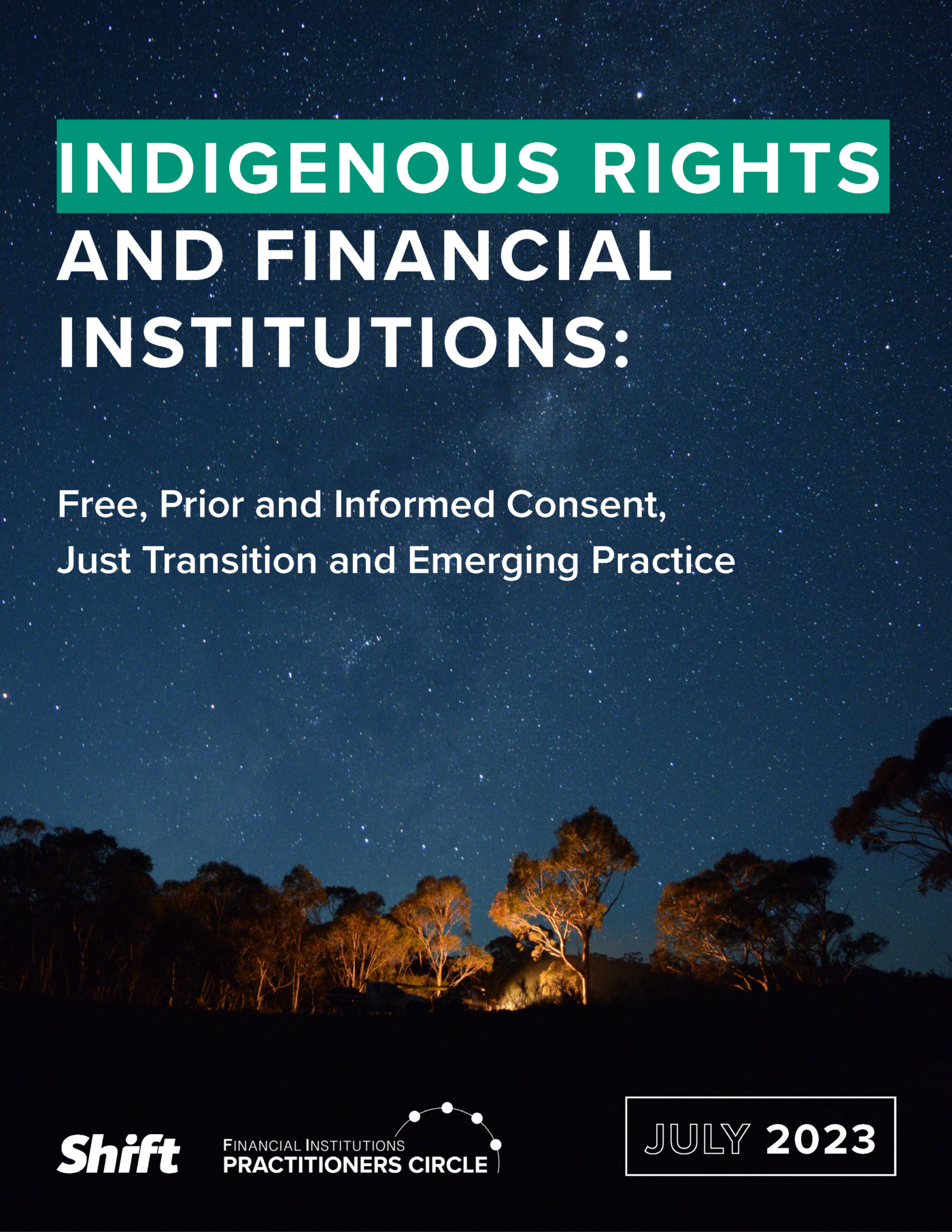
July 2023 |
Indigenous Rights and Financial Institutions: Free, Prior and Informed Consent, Just Transition and Emerging Practice
ReadHowever, the civic space necessary for this important work is being increasingly restricted (see People Power Under Attack, CIVICUS Monitor, 2022). In 2022 alone the Business and Human Rights Resource Centre tracked 555 lethal and non-lethal attacks against human rights defenders. And according to Global Witness’ report, Standing firm: The Land and Environmental Defenders on the frontlines of the climate crisis, at least 177 land and environmental defenders lost their lives last year.
So, what role can – and should – financial institutions play in addressing shrinking civic space? In our latest Financial Institutions Practitioners Circle report, Human Rights Defenders and Shrinking Civic Space: A Guide for Financial Institutions, we explore key aspects of this challenge, including how banks can start to overcome the barriers they may face when engaging with civil society and human rights defenders.
Indigenous Rights and Financial Institutions: Free, Prior and Informed Consent, Just Transition and Emerging Practice
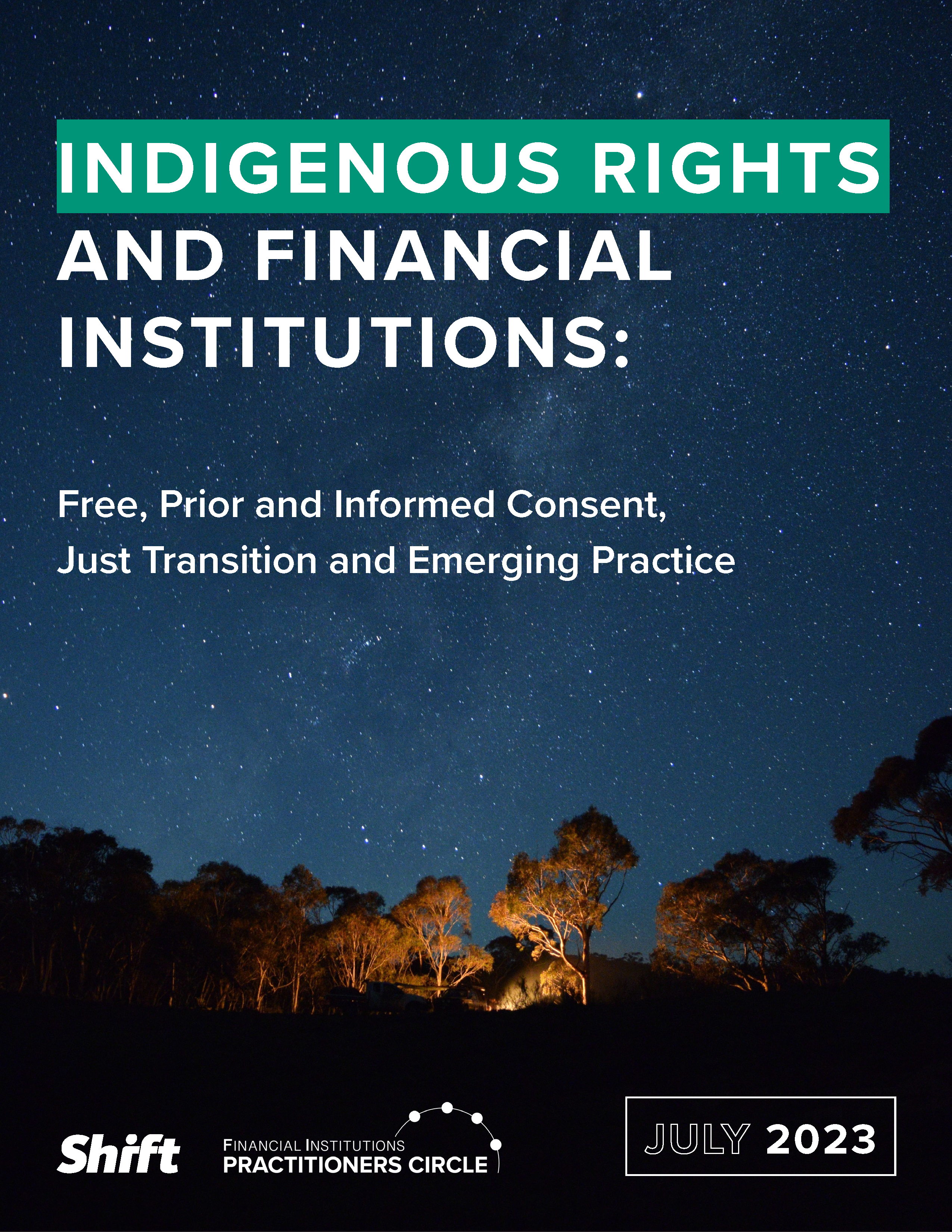
Companies, civil society and the finance sector are paying increasing attention to Indigenous Peoples rights and expertise, which are critical in the context of our most pressing global agenda items: climate change and biodiversity loss. This is not least because much of the world’s biodiversity, and many of the natural resources needed for the energy transition, are located on indigenous territories. However, recent events, from the Dakota Access Pipeline protests to the Juukan Gorge disaster, demonstrate that prevailing approaches to identifying and managing the impacts of business on Indigenous Peoples are falling short. That is, businesses are failing to meet their responsibility to respect indigenous rights under international standards.
Also Read

September 2023 |
Human Rights Defenders and Shrinking Civic Space: A Guide for Financial Institutions
Read
Free, Prior and Informed Consent
Financial institutions (FIs) are critical players in the value chains associated with impacts – both positive and negative – on Indigenous People. With the rapid scale-up of financing for transition minerals and growing awareness of the need for nature-based solutions, FIs must ensure both they and their clients understand and respect Indigenous People’s rights – which includes ensuring that clients obtain “free, prior and informed consent” (FPIC) when developing projects on indigenous lands. Without FPIC, project owners and their financiers face the prospect of conflict, reputational damage, lengthy delays and project cancellations, as well as a failure to meet international standards.
Overcoming Key Challenges to FPIC
In December 2022, Shift held a Financial Institutions Practitioners Circle (FIs Circle) on Indigenous Peoples rights. Two expert contributors, Lloyd Lipsett and Mark Podlasly, shared their insights from decades of experience working with Indigenous Peoples interfacing with development on their lands. Together, we fielded some of the burning questions financial institutions are grappling with as they finance clients with projects or value chains connected to indigenous territories:
- What do FIs need to know when there are differing views on whether a community is “indigenous”?
- How can FIs determine what “good” Free, Prior and Informed Consent (FPIC) processes look like?
- What steps should FIs take when supplied with limited or poor-quality information on respect for indigenous rights by their clients?
- How can FIs spot – and address – power imbalances between clients and Indigenous People?
This paper captures key takeaways from the session, focusing on the responsibility to obtain and maintain FPIC. This focus reflects the importance of FPIC as a process to safeguard Indigenous Peoples rights to self-determination, to participation, and to their lands, territories and resources.
Submission to the International Finance Corporation/Multilateral Investment Guarantee Agency (IFC/MIGA) Consultation on the proposed “Approach to Remedial Action”

At Shift, we have worked for several years with a wide range of financial institutions and their stakeholders seeking to embed the UN Guiding Principles on Business and Human Rights (UNGPs) into their practice, as well as supporting the integration of the UNGPs into the work and tools of various financial industry associations and initiatives. One of our areas of focus has been defining and operationalizing the concept of the ‘remedy ecosystem’ and the important role financial institutions can play in enabling remedy, including in the context of the innovative Dutch Banking Sector Agreement.
From March through April 2022, Shift supported the initial conversations of the IFC/MIGA interdepartmental Working Group on IFC/MIGA’s approach to remedial action by providing initial scoping and research on remedy as reflected in the UNGPs. IFC/MIGA subsequently carried out further analysis and then developed and published a proposed “Approach to Remedial Action” for public consultation. We are pleased to make this submission to that consultation.
We recognize that this is an extremely important topic for IFC/MIGA to be tackling in terms of its potential to deliver meaningful outcomes for people in connection with IFC/MIGA’s own investments and also in the signals that such an approach can send to other financial institutions, particularly national and regional development finance institutions.
IFC/MIGA’s proposed “Approach to Remedial Action” (the Approach) references extensively the concepts of the remedy ecosystem and enabling remedy. On the positive side, we note with appreciation that the Approach considers “prospective and anticipatory measures” throughout the project cycle that could lessen the need for and/or increase preparedness for remedy. However, the Approach is grounded in an assumption that IFC/MIGA’s involvement in remedy will typically take, absent “exceptional circumstances”, the primary form of “facilitating or supporting” its clients’ provision of remedy.
In this submission, we provide some background on the development of these concepts, grounded in the international standards on human rights due diligence (the UNGPs and the OECD Guidelines for Multinational Enterprises), and highlight examples of application of these concepts by financial institutions that we would encourage the IFC/MIGA to consider further. Both the Approach and the External Review reference these authoritative frameworks; moreover, a growing number of bilateral development finance institutions (DFIs) have made commitments and advancements in practice with reference to these standards over the last decade. They are increasingly being incorporated, in whole or in part, into existing or emerging regulations and legislation governing responsible business conduct. Most pertinently, the concepts of the remedy ecosystem and enabling remedy emerged from processes that took these standards as a core reference point.
This submission covers:
- The Centrality of the Connection to Harm Analysis to Concepts of Enabling Remedy
- The Remedy Ecosystem and Enabling Remedy
- The Relevance of Proximity to Harm?
We hope that the IFC/MIGA will draw on this, and other feedback, to reorient the core elements of the Approach to align more fully with the existing International Standards and developing practice among other financial institutions.
Climate Change and Human Rights: Avoiding pitfalls for financial institutions
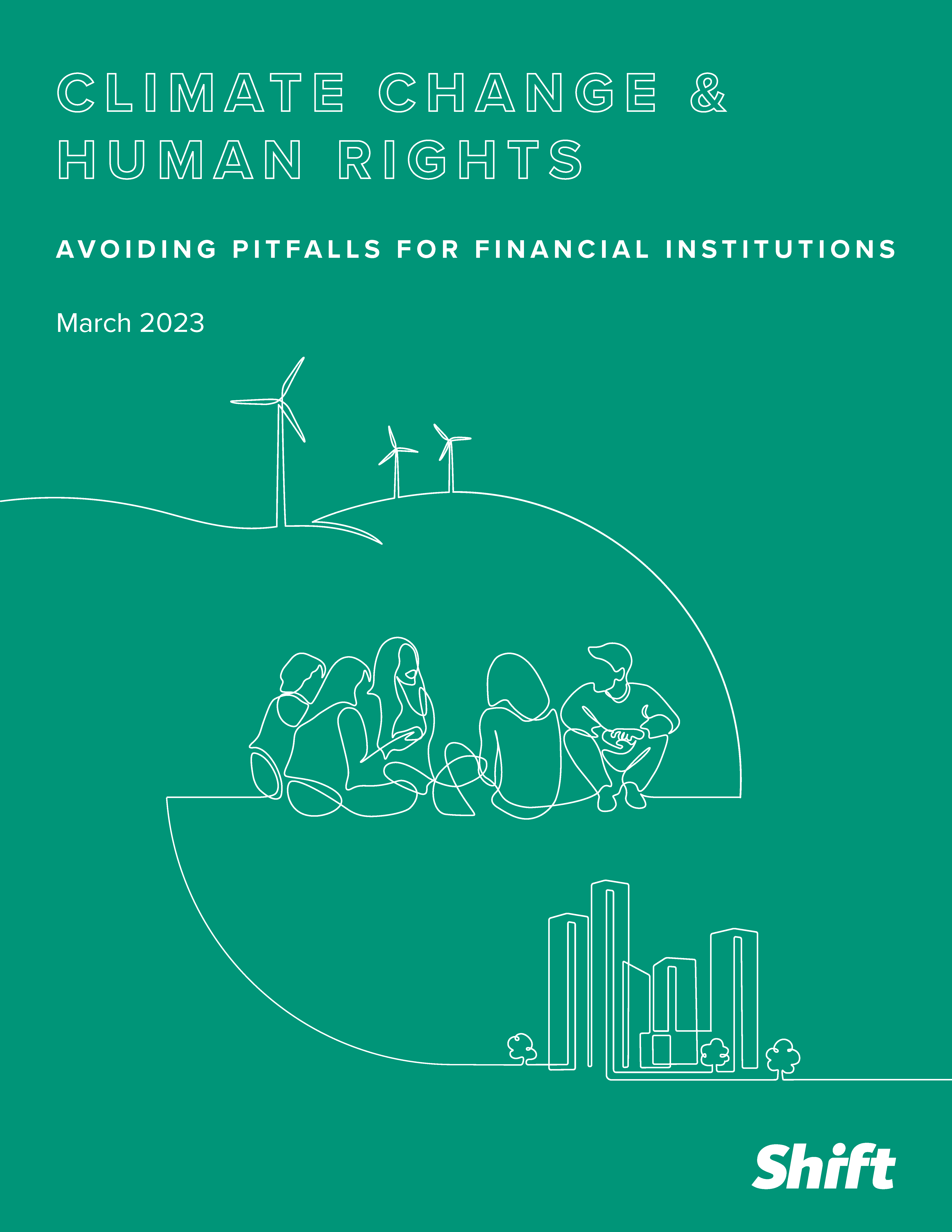
Also Read

July 2023 |
Indigenous Rights and Financial Institutions: Free, Prior and Informed Consent, Just Transition and Emerging Practice
ReadThis paper explores the nexus between climate change strategy and action by financial institutions (FIs) and the responsibility to respect human rights in accordance with the UN Guiding Principles on Business and Human Rights (UNGPs).
It discusses a series of pitfalls for financial institutions to avoid as they operationalize climate-related commitments and explore the social (“S”) dimensions of the challenges and opportunities presented by the activities of portfolio companies. It explores how the human rights lens of the UNGPs – complemented by over a decade of practice since their endorsement – can inform efforts to ensure transition and adaptation efforts respect peoples’ dignity.
The paper is a companion piece to Shift’s report: Climate Action and Human Rights: How the UNGPs can help companies respect human rights when responding to climate change. It benefited from discussions between banks and ECAs in Shift’s Financial Institutions Practitioners Circle.
What data do investors need to manage human rights risks?
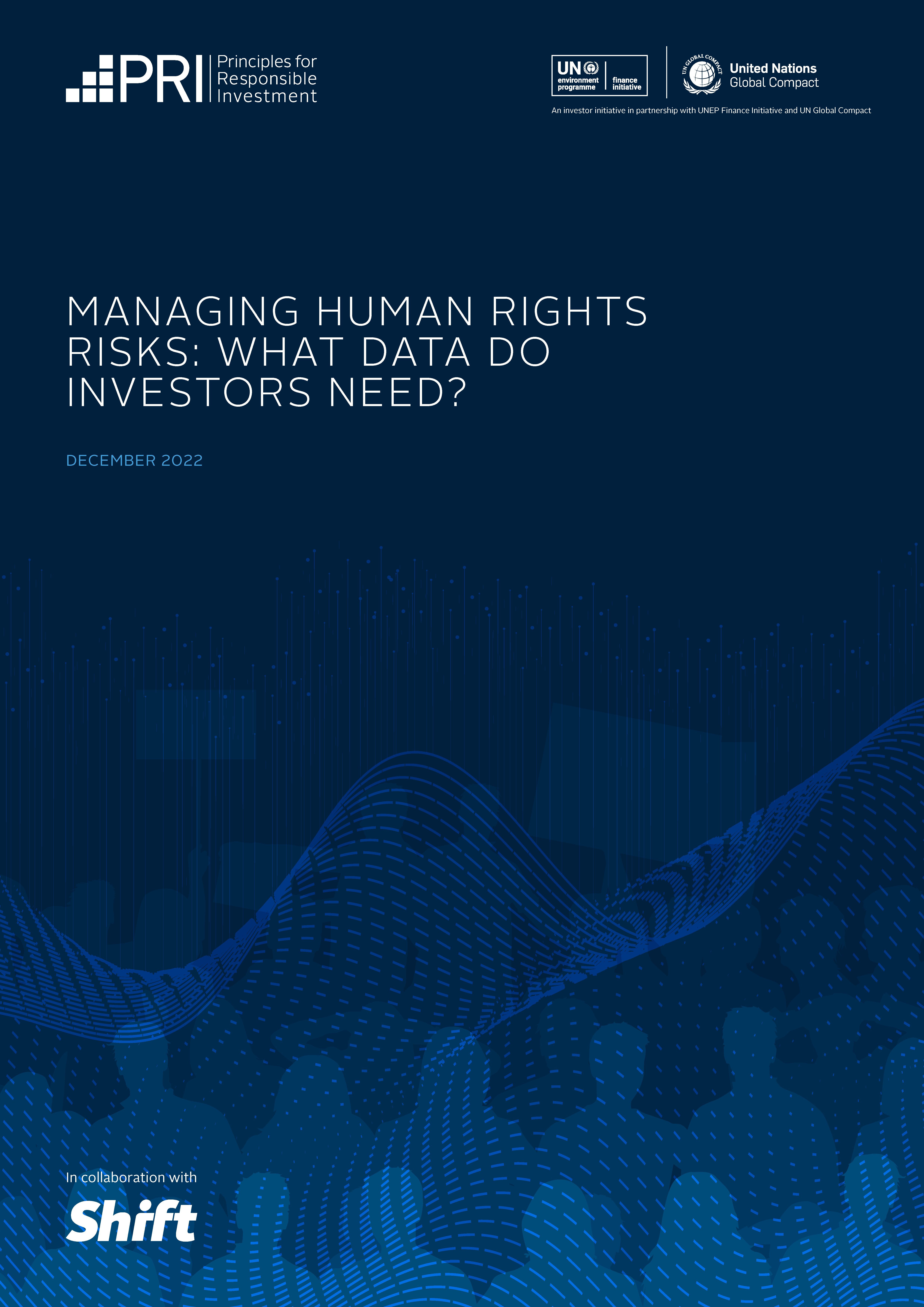
With almost 1 in 4 asset owners using international human rights standards to guide their responsible investment activities last year, investor demand for “better S in ESG” data is growing. Investors are not only considering the impacts on people that arise or could arise from their business activities and investee companies, but they are also trying to understand how risks to people can create financial and reputational risk.
Working together, Shift and UN PRI, the world’s leading proponent of responsible investment, set out to identify the key challenges facing investors in understanding and addressing how portfolio companies manage human rights risks within their operations and value chains. In this paper, they outline four key areas for improving the quantity and quality of information accessible to investors. Download the full report to learn more about how these gaps can be addressed, and how they relate to the latest developments in reporting standards.
